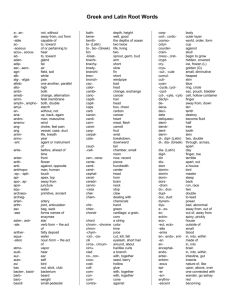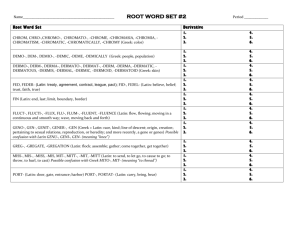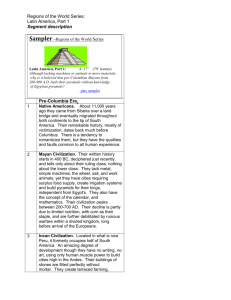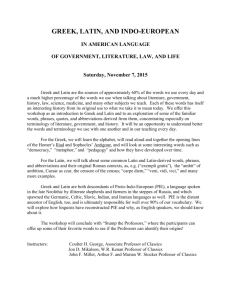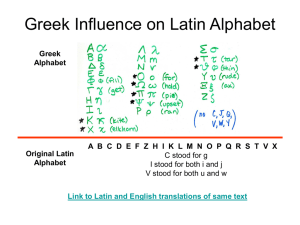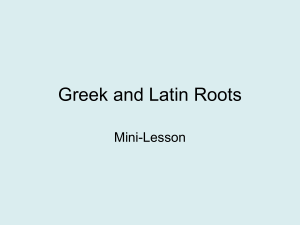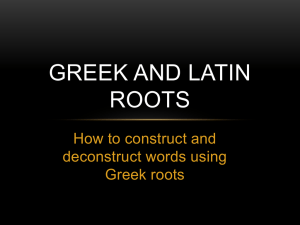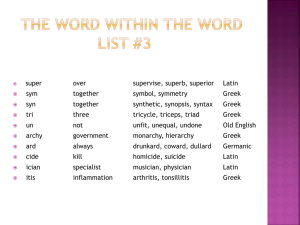Resums Lelouche
advertisement
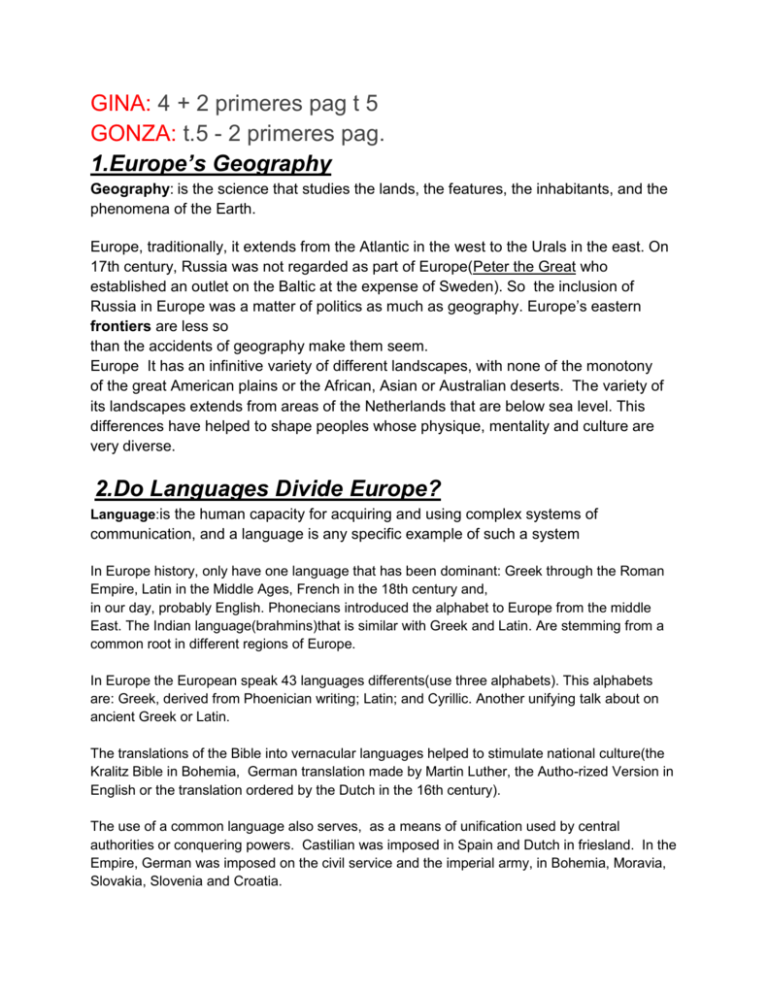
GINA: 4 + 2 primeres pag t 5 GONZA: t.5 - 2 primeres pag. 1.Europe’s Geography Geography: is the science that studies the lands, the features, the inhabitants, and the phenomena of the Earth. Europe, traditionally, it extends from the Atlantic in the west to the Urals in the east. On 17th century, Russia was not regarded as part of Europe(Peter the Great who established an outlet on the Baltic at the expense of Sweden). So the inclusion of Russia in Europe was a matter of politics as much as geography. Europe’s eastern frontiers are less so than the accidents of geography make them seem. Europe It has an infinitive variety of different landscapes, with none of the monotony of the great American plains or the African, Asian or Australian deserts. The variety of its landscapes extends from areas of the Netherlands that are below sea level. This differences have helped to shape peoples whose physique, mentality and culture are very diverse. 2.Do Languages Divide Europe? Language:is the human capacity for acquiring and using complex systems of communication, and a language is any specific example of such a system In Europe history, only have one language that has been dominant: Greek through the Roman Empire, Latin in the Middle Ages, French in the 18th century and, in our day, probably English. Phonecians introduced the alphabet to Europe from the middle East. The Indian language(brahmins)that is similar with Greek and Latin. Are stemming from a common root in different regions of Europe. In Europe the European speak 43 languages differents(use three alphabets). This alphabets are: Greek, derived from Phoenician writing; Latin; and Cyrillic. Another unifying talk about on ancient Greek or Latin. The translations of the Bible into vernacular languages helped to stimulate national culture(the Kralitz Bible in Bohemia, German translation made by Martin Luther, the Autho-rized Version in English or the translation ordered by the Dutch in the 16th century). The use of a common language also serves, as a means of unification used by central authorities or conquering powers. Castilian was imposed in Spain and Dutch in friesland. In the Empire, German was imposed on the civil service and the imperial army, in Bohemia, Moravia, Slovakia, Slovenia and Croatia. 3.Are There Such Things us European Civilization and Culture? Civilization: Is the sum total of political, social, economic, religious and cultural phenomena that can be observed in a society. Culture: The knowledge that a person should acquire so as to enrich the spirit. Through art, literature and science. The means of doing so are supplied, essentially, by education and the medía. Democratic ideal: collective well-being and also derives from the assemblies of ‘free men’, Germanic counterbalance to powers of the leader in time of peace. Before the ideals applied only in a part of the population, bat now in a process of 200 millons years applied in all of population. 1762: Jean-Jacques Rousseau argued people as a political entity, enjoyed absolute, indivisible and nalienable sovereignty. EUROPEAN VALUES Political entity, enjoyed absolute, indivisible and inalienable sovereignty. In the West, Democracy has come to be expressed through parliamentary representation, guaranteed by free elections. Greek democracy by taking root. but this fledgling society was establishing what would become its contribution to Europe. THE EUROPEAN CITIZEN Ancient Greece education: meant studying the work 0f philosophers, writers and artists. At the time of Alexander the Great, the Greeks also studied Eastern culture. ln Rome any cultivated. Culture of Greece were part ofthe Latin heritage and were taught throughout the Empire Middle Ages: the people, students and teachers have to know the latin, but with the sustition of Americans with identities, all of them forgot latin, but a cultivated person remained, essentially a citizen of Europe. 19th century: upsurge of nacionalism lessend the common heritage. After the Second World War: with Western Europe forming the European Community and Eastern Europe being integrated along Soviet lines, culture became more international, although its ends and means were obviously different on either side of the ‘Iron Curtain’. 16th century: descovering of foreign lands, formation of colonial empires. Europe be more popular and trensported all their culture… but in life-style and artistic received a lesson. Rome: added a further basic element to European values, res publica, gave to constitutional thought, the consept of separation of powers - legislative, executive and judiciary. Statute law: spread to cover all the acts of life, whether civil or public, and extended throughout Europe and then the world. Individual liberty: not need to linking humanity to God and proclaiming ‘jesus as Qod made Man’. Salvation: supreme happiness it’s somthing individual. The Christian spirit success taught that happiness was to be found in a tranquil conscience. Renaissance: rediscovery of humanist intellectuals achieved a synthesis of the Greco-Roman heritage and Christian thought.-> ideals came together: democracy, equity under the rule of law, human equality and personal happiness based on individual freedom. from Diderot and Bentham. State took the initiative in condemning torture and slavery, upshot 1948 Declaration of Human Rights. Western civilization: European civilization dissolving. In national levels, the culture havel differences and are most passionately upheld. 4. Society and Economics Unbridled economic power: The Greeks ran an organized economy. They established colonies in the Mediterranean partly to control trade in the goods they needed. The Romans also organized their Empire for economic as wel] as political ends. Tńe rise of the monasteries Christianity brought revolutionary change. By valuing human beings, r'egardiess of their rank or wealth, under a single God, protector of the poor, it rooted the idea of equality. After the fall of the Roman Empire, monasticism gave practical expression to the links between religion, economics and society. Until the 19th century, all over Europe, the Church used part of its revenue to spread wealth more evenly. Capitalism arose in the 15th century, beginning with banks in Florence and Augsburg and developing through the stock markets of Antwerp and Amsterdam. IThe growing power of the nation-states rapidly attracted leading bankers to the courts of Europe, where they became influential advisers. But until the 19th century state intervention in the economy was hardly ever motivated by social concerns. The birth of Socialism Beginning in Britain, the Industrial Revolution spread to Continental Europe towards the end of the 18th century and above ali in the 19th. It completely reorganized methods of production and brought about unprecedented social change Wealth was concentrated in the hands of a few leading families and many people left the countryside to become rootless, cooped up in towns or coal-mining areas. This raised once more, often dramatically, the problem of redistribution. Utopian Socialists, tried at the beginning ofthe 19th century to establish ‘lay monasteries’. They failed. But Others worked out means of action that proved effective. Trade unionism, born in Britain, harnessed forcesstrong enough to stand up against the interests of the wealthy and obliged governments to pay attention. Soon, social movement turned to politics. The Welfare State UNANSWERED QUESTIONS IN EUROPE’S HISTORY
